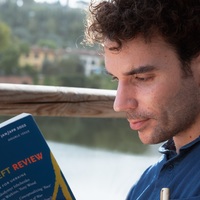
Cornel Ban
Associate Professor at Copenhagen Business School
less
Related Authors
Jessel Nuñez
Polytechnic University of the Philippines
Troy Vettese
University of California, Berkeley
Marc-William Palen
University of Exeter
Herman Patrick
University of Dar es Salaam
Antulio Rosales
York University
Xueting Shen
National University of Singapore
InterestsView All (16)







Uploads
Papers by Cornel Ban
Central Banking in Pandemic Times
Collections: Special Collection: Global Political Economy of COVID-19 , Section: Political Economy, Markets, and Institutions
Cornel Ban
1.cba.ioa@cbs.dk
Global Perspectives (2021) 2 (1): 24188.
https://doi.org/10.1525/gp.2021.24188
Article history
Share Icon
Share
Tools Icon
Tools
Search Site
The sense of extreme disruption brought by Covid-19 led to the fast adoption of unprecedented containment policies. Central banks played a key role in this regard by adopting bold and unprecedented forms of financial stabilization as well as support for government debt in the bond markets. The overall effect has been the blurring of the boundary between monetary and fiscal policy, a key pillar of the “neoliberal” era. Furthermore, the Fed acted as a de facto lender of last resort in dollars of the global financial system, thus playing a global stabilization role even as the Trump administration worked to weaken traditional US ties to global economic governance.
This was a political choice anchored in a specific transnational epistemic elite whose membership cut across critical sites of European governance: European banks, their accountants and their lawyers, the ECB, the Commission and academia. The international regime they created provided more collateral at the cost of eroding banks’ loyalty to their government’s bonds, as the diverse investor base and the availability of alternative sources of collateral reduced the costs of exit for banks faced with sovereign risk. In sum, the Euro plus the repo turned ostensibly European lending into international lending in a common currency with disastrous results when the sudden stop occurred.
When the run on repo began in the Eurozone, these systemic transformations in state-finance relations percolated deeply in how fiscally balanced countries like Spain conducted fiscal policy. At first, the crisis ushered in a recalibration of neoliberal fiscal theories with bold Keynesian ideas that pushed the limits of mainstream fiscal policy. This approach was owed to the prominent positions in the state held by Spanish economists who had been at the forefront of major intellec¬tual shift in global macroeconomics. Given that the Spanish policy process was highly centralized and the prime minister’s transnationalized economic advisers socialized him into this synthesis of neoliberal and Keynesian ideas, between 2008 and 2010 Spain met the crisis with the largest expenditure- based stimulus in Europe.
However, when the sovereign bond market crisis that struck the “periphery” of the Eurozone in the spring of 2010 brought the Spanish financial system and the fiscal position of the Spanish government to the edge of the precipice, EU-level coercive mechanisms kicked into gear alongside market-based ones, terminating this Spanish experi¬ment. As the solutions provided by the European governance of the crisis failed to stabilize the bond markets in the “periphery” and with the ECB acting as the enforcer of fiscal orthodoxy, Spain came under extreme pressure to dismantle its attempt to shield society against the dislocations produced by the dramatic shrinking of cross-border finance.
austerity rather than any other instrument of rebalancing. The main value added of the paper is to show how systemic-level changes in Europe’s state-finance relations opened up new spaces of policy coercion exercised by the central bank of the monetary union. When the run on repo began in the Eurozone, these systemic transformations in state-finance relations percolated deeply in how fiscally balanced countries like Spain
conducted fiscal policy. At first, the crisis ushered in a recalibration of neoliberal fiscal theories with bold Keynesian ideas that pushed the limits of mainstream fiscal policy. This approach was owed to the prominent positions in the state held by Spanish economists who
had been at the forefront of major intellectual shift in global macroeconomics. Given that the Spanish policy process was highly centralized and the prime minister’s transnationalized economic advisers socialized him into this synthesis of neoliberal and Keynesian ideas, between 2008 and 2010 Spain met the crisis with the largest expenditurebased stimulus in Europe. However, when the sovereign bond market crisis that struck the “periphery” of the Eurozone in
the spring of 2010 brought the Spanish financial system and the fiscal position of the Spanish government to the edge of the precipice, EU-level coercive mechanisms kicked into gear alongside market-based ones, terminating this Spanish experiment. As the solutions provided by
the European governance of the crisis failed to stabilize the bond markets in the “periphery” and with the ECB acting as the enforcer of fiscal orthodoxy, Spain came under extreme pressure to dismantle its attempt to shield society against the dislocations produced by the dramatic shrinking
of cross-border finance.
To apply for the conference, please submit a title and an abstract of your paper (max 300 words) in English to telciuconferences@gmail.com until 5th of May 2018. Romanian scholars are requested to send the abstract also in Romanian. We will inform you about our decision by the 15th of May, 2018. The organizers will cover meals for the speakers as well as free accommodation for maximum 6 speakers, based on need and by request. Independent researchers or junior researchers will be given priority with accommodation.